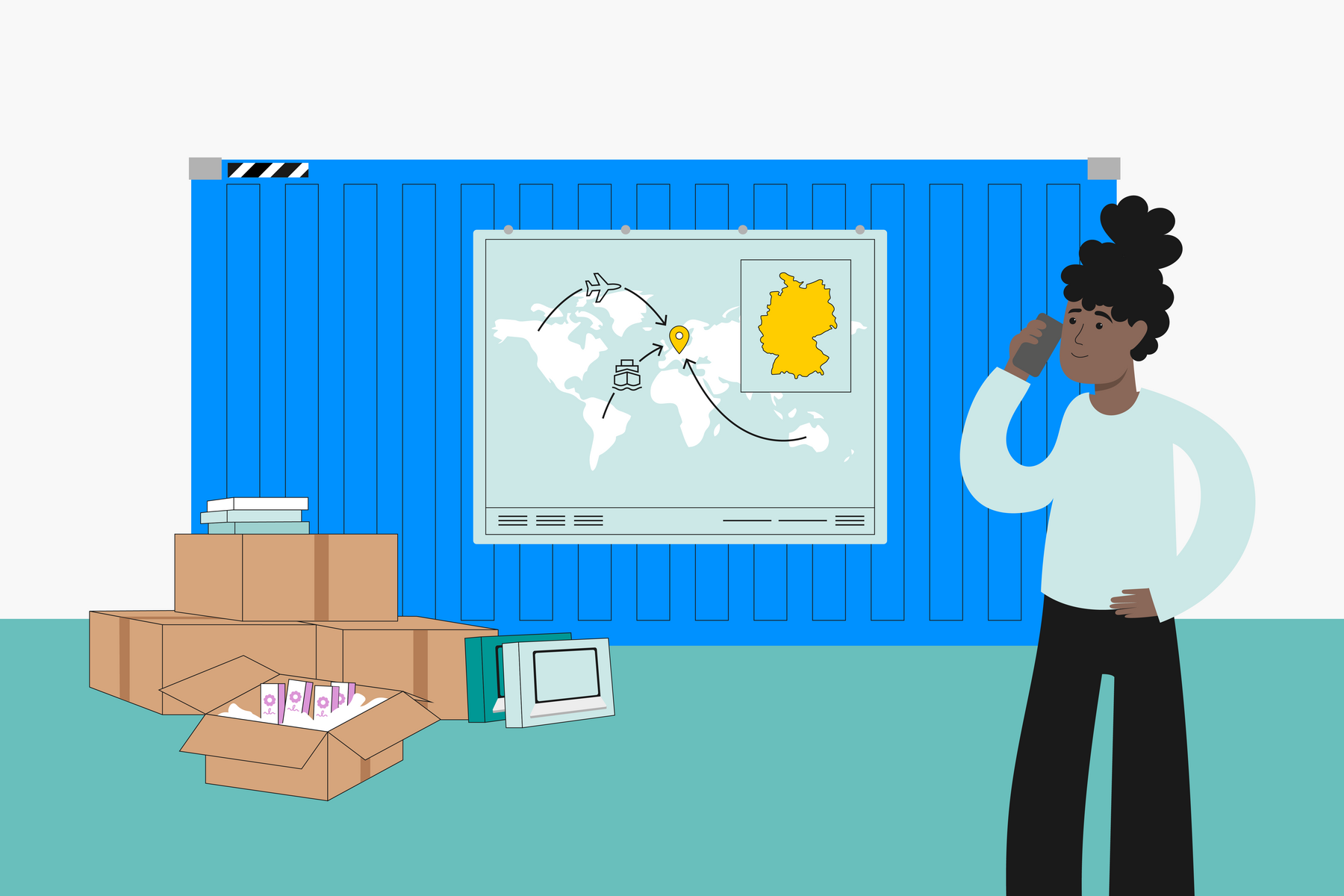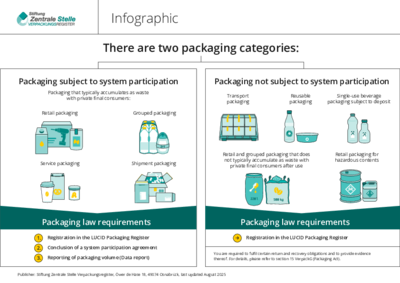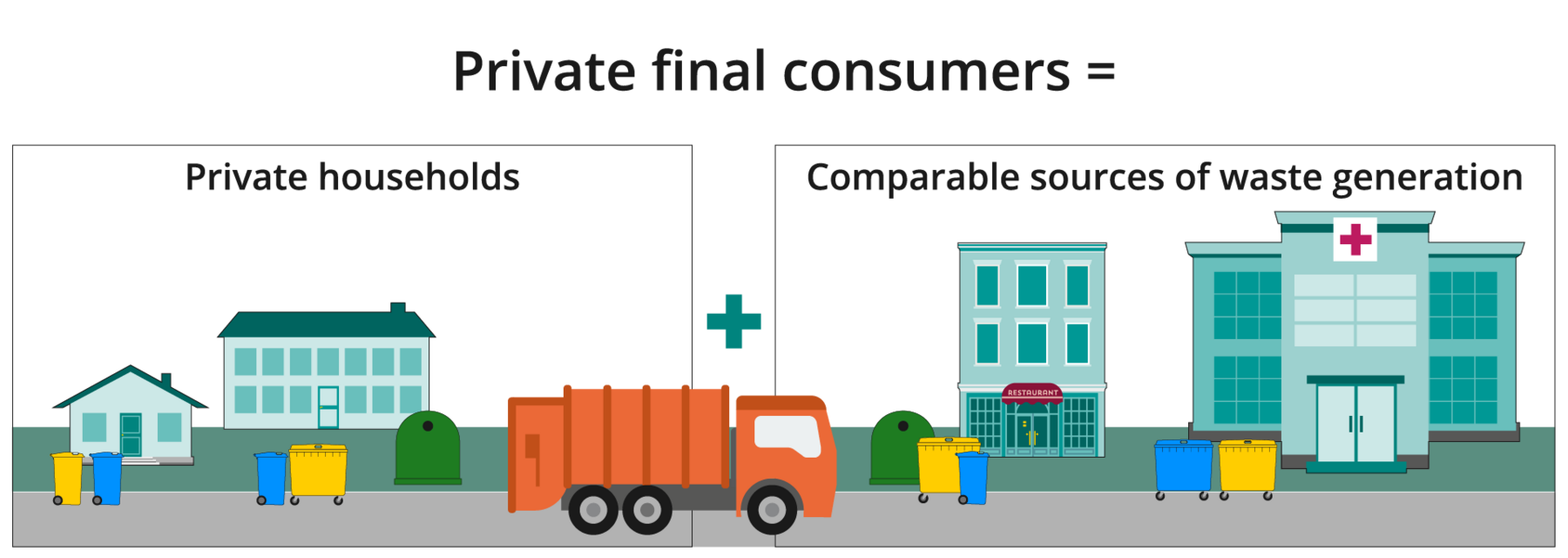What types of packaging are there? What are the statutory obligations that come with each of them?
Importer obligations in detail: registration, participation, reporting
Companies that introduce and sell their packaged goods on the German market on a commercial basis have to fulfil packaging law obligations. These apply to companies from Germany and abroad. This knowledge base provides importers with an overview of all the information they need to fulfil their obligations.
What applies for imports?

The party bearing legal responsibility for the packaged goods at the time they cross the border is the party under obligation under packaging law and is considered the importer of the goods. Legal responsibility means that the party introducing the goods to the German market bears the transport risk for loss of or damage to the goods, for example, and is responsible for customs clearance. The question of who bears legal responsibility should be contractually agreed upon between the parties involved before the goods are placed on the German market.
Heads-up: Incoterms, international commercial terms that are used to determine the contractual rights and obligations of each contracting party, can serve as a point of reference.
Regardless of what type of packaging importers use to introduce their goods commercially for the first time to the German market – they must always register with the LUCID Packaging Register. The specific obligations depend on the packaging: if it typically accumulates as waste with private final consumers, you need to pay for its recycling.
Obligations for packaging subject to system participation: registration, participation, reporting
Retail, grouped and shipment packaging is subject to system participation if it typically accumulates as waste with private final consumers, meaning you have to pay for the recycling of this packaging. There are three things you need to do to fulfil your obligations under German packaging law:
Register with the LUCID Packaging Register.
Enter into a system participation agreement with a system operator. A list of system operators can be found here.
You now have to regularly report your packaging volumes that are subject to system participation to both your system operator and the LUCID Packaging Register (data reporting).
Who is a private final consumer?
The Verpackungsgesetz (Packaging Act) defines private final consumers as private households and comparable sources of waste generation such as restaurants, hotels, hospitals, canteens, amusement parks, garden centres, laundries, libraries and schools. Comparable sources of waste generation also include craft enterprises and agricultural holdings where packaging waste is collected at the rate that is normally associated with private households, i.e. at 14-day intervals and in a waste bin that does not exceed 1,100 litres per collection group. A list of comparable sources of waste generation can be found here.
Packaging not subject to system participation
Packaging not subject to system participation includes transport packaging, industrial packaging or reusable packaging. If you are also or exclusively using this packaging type to distribute your products, you must register with the LUCID Packaging Register. You do not need to fulfil the system participation requirement and you do not need to report your packaging volumes. However, you are required to fulfil certain return and recovery obligations and to provide evidence that you have done so. For details, please refer to section 15 VerpackG (Packaging Act).
Importers: applicable obligations by packaging type
The party bearing legal responsibility for the packaged goods at the time they cross the border is the party under obligation.
Online retailers located abroad send goods to their customers in shipment packaging. Labels, tape or filler material are also considered shipment packaging. Including all its components, it is almost always subject to system participation, which is why you have three obligations to fulfil: registration, participation, reporting. This also applies if you are manufacturing, packaging and shipping your products yourself. In this case, you are also responsible for the retail or grouped packaging of the products.
When products are directly shipped to private final consumers, it can usually be assumed that the company located abroad bears legal responsibility at the time they cross the border.
Heads-up: Do you work with a fulfilment service provider? Then you are still the party under obligation within the meaning of the Verpackungsgesetz. Further information can be found under 'Fulfilment' on our website.
An online shop located outside of Germany can also be the responsible importer if the packaged goods of another producer are delivered directly to private final consumers in Germany. In this case, the respective online retailer assumes the packaging law obligations of the retailer from whom they purchased the goods that they sell. This means that they have to fulfil the packaging law obligations for both the shipment packaging – including all filler material and labels – and the retail packaging of the goods if they typically accumulate as waste with private final consumers.
They produce goods and package them in retail or grouped packaging, which is subject to system participation. This is because it typically accumulates as waste with private final consumers. In this case, they are required to register with the LUCID Packaging Register, participate their packaging with a system and report their packaging volumes.
Heads-up:
- If you are distributing your goods to downstream sellers and using packaging (such as palettes, cardboard boxes or shipping envelops) to do so, you must check what obligations you have to fulfil. This depends on whether the packaging is shipment or transport packaging. The specific situation, the sector or the distribution channel (B2B or B2C) is not decisive. Instead, you have to check where the packaging of the respective goods accumulates as waste.
- If you are repackaging imported goods (processed or unprocessed) and use additional packaging to do so, you must check whether this packaging is subject to system participation.
Check our system participation requirement catalogue to find answers to both of these questions.
The provisions of the Verpackungsgesetz (Packaging Act) apply within the Federal Republic of Germany. When packaging is exported outside of its jurisdiction, the Act does not apply. The relevant laws will be the laws of the destination country, which must be observed. EU legal provisions from the EU Packaging and Packaging Waste Directive mean that similar provisions apply throughout EU Member States. This also applies in the case of goods that are merely in transit through Germany.
Specific scenarios based on international commercial terms (Incoterms):
A distributor (e.g. online retailer or retail company) located in Germany is buying goods directly from a distributor located abroad
In this case, the specific contractual provisions agreed upon between the contracting parties are decisive. It must be determined who bears legal responsibility for the goods at the time they cross the border (and who, therefore, is considered to be the importer within the meaning of the Verpackungsgesetz). Here are two typical scenarios, explained on the basis of Incoterms:
'Ex Works' (EXW)
If the production plant is abroad, legal responsibility for the goods at the time they cross the border always rests with the buyer. In this case, the buyer is the distributor in Germany.
'Delivered at place' (DAP)
If the agreed place of delivery is in Germany and the seller abroad is responsible for the delivery, the seller usually also bears legal responsibility for the packaged goods crossing the border.


